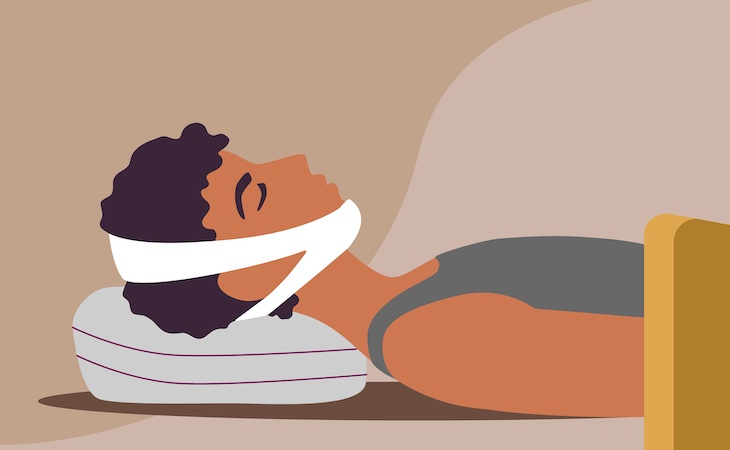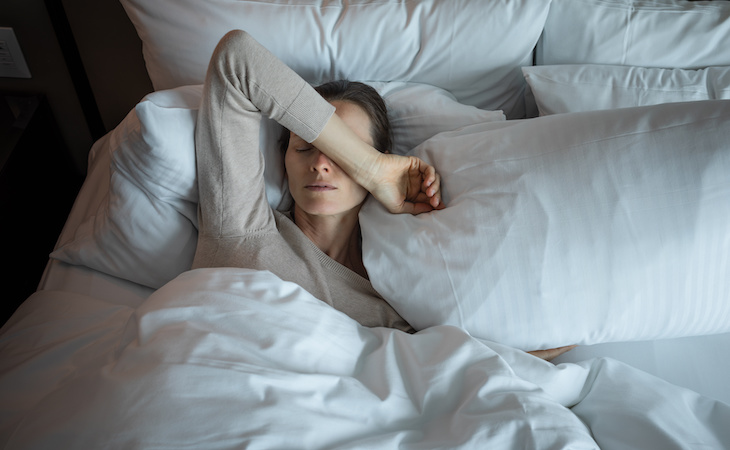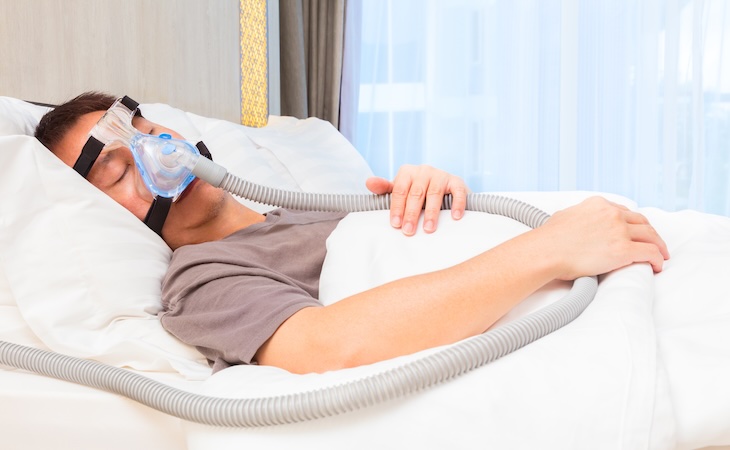If you suffer from sleep apnea, then chances are you’ve given most remedies the old college try. From mouthguards to wedge pillows, there are lots of trends out there that claim to help treat the start-and-stop breathing caused by this disorder.
The latest one making sound waves (pun intended) on social media, though? Chin straps, which work to keep the mouth shut while sleeping. Plus, there’s the potential added bonus of improving sagging skin and neck wrinkles when they’re worn overnight, proponents of this trend say.
The question is, do chin straps actually work? Keep reading to find out more about what they do and whether they really help treat sleep apnea and sagging skin.
What is a chin strap?
It may seem obvious, but a chin strap is a strap that goes around your chin and then wraps around your head.
“Chin straps cradle your chin and wrap around the top and back of your head to create a comfortable sling that keeps your mouth closed while you sleep,” says Raj Dasgupta, MD, chief medical advisor for Sleepopolis.
A chin strap is a strap that goes around your chin and then wraps around your head.
Chin straps keep your mouth closed and minimize air leakage, so they can be helpful when paired with CPAP therapy—especially if you tend to sleep with your mouth open and experience dry mouth. They typically fasten with hook and loop closures at the sides or top of the head.
How do chin straps work?
“A chin strap keeps your mouth closed while you sleep, which can help prevent mouth breathing,” explains Dasgupta.
For people with obstructive sleep apnea (OSA), Dasgupta says it’s thought that keeping the mouth closed might help reduce snoring by encouraging you to breathe through your nose.
Do chin straps for sleep apnea work?
Honestly, there isn’t much supporting evidence around when it comes to the effectiveness of chin straps.
In fact, a study conducted by NJ Neuroscience Institute at JFK Medical Center/Seton Hall University found that incorporating a chin strap into a nightly sleep routine provided no significant difference in sleep-disordered breathing or improving snoring.
“Chin straps alone are not a treatment for obstructive sleep apnea (OSA),” Dasgupta says. “While chin straps might help reduce mouth breathing for some people, they don’t solve the underlying issue of OSA, which is the collapse of the upper airway during sleep.”
“While chin straps might help reduce mouth breathing for some people, they don’t solve the underlying issue of OSA, which is the collapse of the upper airway during sleep.”
-Raj Dasgupta, MD, chief medical advisor for Sleepopolis
Do chin straps for sagging skin work?
Chin straps aren’t just used for sleep apnea. Additionally, some people use them in their evening skincare and sleep routines to help reduce sagging skin and double chins.
“There are claims that chin straps can help to lift the face, reduce a double chin, and create a slimmer and snatched jawline,” says Hadley King, MD, a board-certified dermatologist in New York. “But these benefits aren’t proven, and any results that come from temporarily compressing soft tissues are not likely to be long-lasting.”
King cautions against thinking chin straps can have lasting effects. “After face and neck surgical procedures, a chin strap or other compressive dressing may be helpful to reduce or prevent fluid accumulation in the soft tissues,” she says. “Otherwise, no, I think this is hype.”
Are there any risks to using a chin strap?
If you’re curious about using a chin strap, there are a few risks you should be aware of first.
Lymphatic circulation
“If the strap is tight, it could impair lymphatic circulation,” King says. “We need lymphatic circulation to drain excess interstitial fluid and waste and for the functioning of the immune system.”
False sense of security
“If you have obstructive sleep apnea, relying on a chin strap alone will give you a false sense of security without actually treating your underlying condition,” Dasgupta says.
Discomfort
The main thing to keep in mind when using a chin strap is that it fits comfortably around your chin, jaw, and head without being too tight or overly compressive. Dasgupta advises that they shouldn’t be worn too tightly since this can lead to jaw or facial pain.
Difficulty breathing
“Although reducing mouth breathing could be helpful to reduce snoring in some people, for those with nasal congestion or other anatomical obstructions, a chin strap could make breathing more difficult,” King says.
The bottom line on chin straps
While it may be exciting to think of an alternative way to combat sleep apnea, unfortunately, chin straps don’t have much evidence to support their functionality.
The best treatment for sleep apnea is using a CPAP machine. When it comes to sagging skin, using specific moisturizers and night creams can help as can some surgical procedures (for those, you should consult with a dermatologist or plastic surgeon).
FAQs
Are chin straps for sleep apnea safe?
When used correctly, chin straps for sleep apnea shouldn’t be too invasive or unsafe. Be sure not to make them too tight as this can lead to discomfort, difficulty breathing, and issues with lymphatic circulation.
Using a chin strap that’s too tight can also misalign the jaw or bite. “If you have jaw problems (like TMJ), using a chin strap could make things worse,” Dasgupta explains.
Does a chin strap really work?
If you’re considering chin straps for sleep apnea or a chin strap for sagging skin, unfortunately, there isn’t much evidence to support them doing too much.
Especially when it comes to sagging skin, using a chin strap is a temporary fix that won’t permanently alter your jaw or double chin.
Can a chin strap replace a CPAP machine?
Simply put? No. There’s no research to support the replacement of a CPAP machine with a chin strap for sleep apnea. Additionally, both King and Dasgupta advise against it.
“Chin straps alone are not a treatment for obstructive sleep apnea,” Dasgupta says. “The main treatments for OSA are CPAP machines, mandibular advancement devices, or sometimes surgery.”
Do nasal strips work for sleep apnea or snoring? Learn about the pros and cons of using nasal strips while you sleep.




